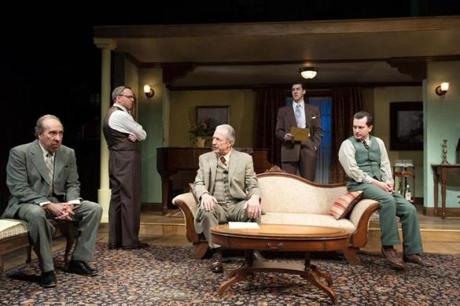Theater Review: The Wages of Guilt — The Shocking Relevance of “Operation Epsilon”
Are those who merely stand and watch as guilty as those who drop the bombs, pull the triggers, or run the trains? The question is no less relevant today than more than 60 years ago.
Operation Epsilon by Alan Brody. Directed by Andy Sandberg. Staged by Nora Theater Company, a project of Catalyst Collaborative@MIT. At Central Square Theater, Cambridge, MA, through April 28.
By Iris Fanger
“Hell is other people,” Jean-Paul Sartre famously posited in his landmark play No Exit, and that bitter existential perspective certainly fits the poisonous atmosphere of the house in Britain where 10 German nuclear scientists were imprisoned for eight months after World War II. Drawing on tapes made by the Allies, who secretly bugged their rooms and recorded their conversations (in order to determine if these men had been working towards creating an atomic bomb), playwright Alan Brody has dramatized the caged confrontations fraught with suspicion, arrogance, guilt, and fear.
An ensemble of 11 male actors in suits take on the roles of the real people. Among them are the scientists, led by three Nobel Prize winners: Otto Hahn, credited with the discovery of nuclear fission; Max von Laue, a distinguished elder-scientist who opposed Hitler but remained in Germany during the war; and Werner Heisenberg, poster boy for the German nuclear effort. The other side is represented by T. H. Rittner, the British major in charge of the operation. Heisenberg was also one of the protagonists in Michael Frayn’s 1998 play Copenhagen, which speculated about the motives behind Heisenberg’s visit with Niels Bohr.
The scientists were picked up in the summer of 1945 after V-E Day but before the Americans dropped the bomb on Hiroshima. They had no idea why they were being held, where they were, and why they could not contact their families. Their bewilderment at this treatment, plus the rivalries that had wracked the “Uranium Club,” the name given to the German teams of physicists working on atomic matters, ratchets up the play’s considerable tension, which unfolds during the period before their release on January 1, 1946. Janie E. Howland has designed a two-story, comfortable, British, country house set for the men to prowl.
Under the sure-handed direction of Andy Sandberg (at the helm of a world premiere production via the Nora Theater Company), the complex depths of the men’s emotions about the “fatherland,” particularly their concern about their reputations and their place in history, are deepened when they are told that the Americans had bombed Hiroshima, meaning that German science had been eclipsed. The reactions range from disbelief on the part of Heisenberg, who did not think it possible, at least not according to his calculations, to Hahn’s anguish over his part in the loss of more than 300,000 lives. Heisenberg is insistent that the group release to the press a memorandum that denies that they were working towards developing a bomb “for Hitler.” They know that the winning side will use its power to dictate the writing of history—the ironic interconnections between politics and the “creation” of the past is one of the central themes of Brody’s play. The elephant in the room—the issue of Anti-Semiticism—is only obliquely discussed but well understood by those on the losing side. It was the Jewish scientists, many of them forced to leave Germany, who contributed to the brain power that generated the Manhattan Project in America.

Ken Baltin, Kendall Hodder, Will Lyman, Dan Whelton, and John Kooi in Nora Theatre’s OPERATION EPSILON. Photo: A.R. Sinclair Photography
Will Lyman as Hahn is the most sympathetic character on stage, his grief over the outcome of his life’s work evident. However, in a lively scene of celebration that takes place after the announcement that he has won the 1944 Nobel Prize in Chemistry (in November 1945 while he is still being held in Britain), Hahn appears to lose any remorse amid the cheer. Diego Arciniegas as Heisenberg is a fascinating contrast in character. He is concerned about maintaining his reputation in the international pantheon of physicists; he has little empathy for the victims of the war. As Heisenberg, Diego Arciniegas is tightly wound, nimbly mysterious about the reasons for his mathematical errors that delayed the German project. This ambiguity has yet to be resolved. Was Heisenberg simply wrong in his calculations, or was he deliberately trying to sabotage the work? Ken Baltin, as Max Von Laue, serves as the pater familias of the group, continually trying to make peace among the factions.
The final scene is inspired by an actual letter to Hahn from his colleague, Lise Meitner, who had escaped from Germany in 1938. The revelation comes as a metaphorical blow to the theatrical gut because it affirms the culpability of all those who remained passive in Germany during the war. The lights come down too suddenly for either the characters or the audience to absorb her powerful accusations. Are those who merely stand and watch as guilty as those who drop the bombs, pull the triggers, or run the trains? The question is no less relevant today than more than 60 years ago.
Tagged: Alan Brody, Catalyst Collaborative@MIT, Central Square Theater, Nora Theater Company

